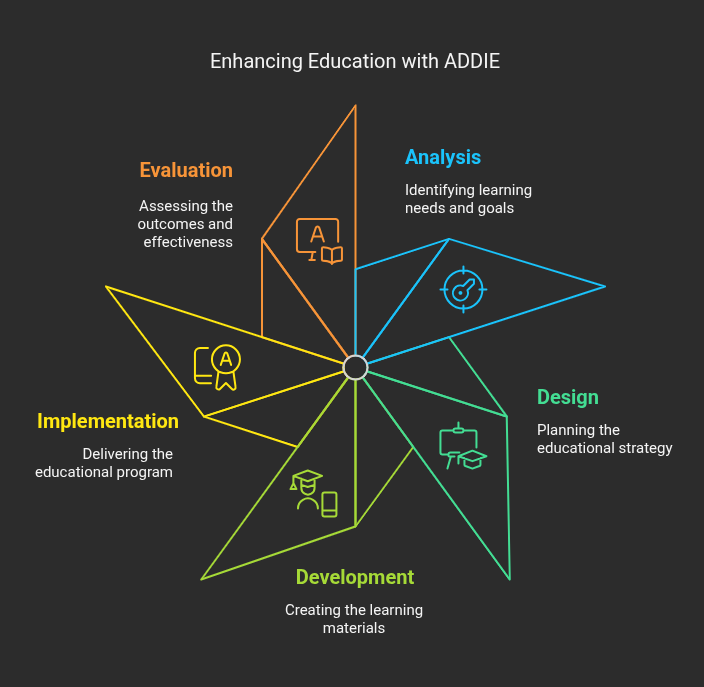Development of Worksheet Based on Problem Based Learning (PBL) to Improve Critical Thinking Skills
https://doi.org/10.51574/kognitif.v5i1.2779
Keywords:
Development , Worksheet , Problem Based Learning (PBL) , Critical thinkingAbstract
This study develops a Problem-Based Learning (PBL)-based Student Activity Sheet (Worksheet) to enhance students' critical thinking skills. Using the Research and Development (R&D) approach with the ADDIE model (Analyze, Design, Development, Implementation, Evaluation), the research involved Grade VII students at Nurul Iman Integrated Islamic Middle School. Data collection employed validation sheets, student response questionnaires, critical thinking tests, and observation and interview guidelines, analyzed through Miles & Huberman’s framework. Results indicate that the developed PBL-based Worksheet is of high quality, validated by material experts (average score: 137.5) and media experts (100.5). Student responses rated its practicality as good (score: 80). A Paired Sample T-Test showed a significant improvement in students’ critical thinking skills, with a 41% increase (moderate category). Comparisons with previous studies highlight the Worksheet’s novelty, while addressing limitations—such as sample size, intervention duration, and generalizability—would enhance its academic rigor. The findings suggest that integrating PBL-based Worksheets into instruction effectively supports critical thinking development. Further research should explore its applicability across different educational levels and examine the potential integration of technology.
Downloads
References
Astuti, W. (2018). PBL-based Worksheet to improve students’ critical thinking skills.
Awang, H., & Ramli, R. (2008). Creative thinking skills approach through problem-based learning.
Chalkiadaki, A. (2018). Students’ analytical reasoning abilities in the context of the Industrial Revolution 4.0. Journal of Education and Technology, 21(3), 112–126.
Lee, J. (2018). Non-cognitive predictors of academic achievement: Evidence from TIMSS and PISA. Learning and Individual Differences, 65, 50–64. https://doi.org/10.1016/j.lindif.2018.05.009
Lindner, C., Rienow, A., Otto, K.-H., & Juergens, C. (2022). Development of an App and Teaching Concept for Implementation of Hyperspectral Remote Sensing Data into School Lessons Using Augmented Reality. Remote Sensing, 14(3). https://doi.org/10.3390/rs14030791
Masruroh, L., & Raharjo, T. (2024). Development of PBL-based E-Worksheet to improve critical thinking skills in the food substance sub-material. BioEdu Journal, Surabaya State University.
Monalisa, C., Ahda, Y., & Fitria, Y. (2019). Critical thinking skill improvement using problem based learning (pbl) model of 4th grade students of elementary school. … Journal of Science and …. http://repository.unp.ac.id/21930/
Munifah, Iskandar, T., Muhamad, Y., Ninik, Z., Syamsul, H., Fitria, L., & Ali, R. (2019). Management Development of Student Worksheets to Improve Teacher Communication Skills: A Case Study Self-Efficacy and Student Achievement. Education Journal of Gifted Young Scientists, 7(4), 777–798. https://doi.org/https://doi.org/10.17478/jegys.625618
Nafiah, N., & Suyanto, S. (2015). Application of problem-based learning in PC repair and reset learning to improve critical thinking skills of vocational high school students.
O.E.C.D. (2019). PISA 2018 results.
OECD. (2015). OECD Programme for International Student Assessment (PISA).
Pitriyana, R., & Arafatun, S. (2021). Development of PBL-based Worksheet to improve critical thinking skills of grade VI elementary school students. Jurnal Ilmiah Kependidikan.
Rahmawati, L. (2022). The effect of implementing problem-based learning on improving students’ critical thinking skills in fraction learning in elementary schools.
Rihayati. (2021). Improving Critical Thinking Ability through Discovery Learning Model Based on Patiayam Site Ethnoscience. Journal of Physics: Conference Series, 1823(1). https://doi.org/10.1088/1742-6596/1823/1/012104
Ritonga, A. (2024). Development of PBL-based Worksheet on critical thinking skills in physics learning. UIN Imam Bonjol Repository.
Serevina, V. (2018). Teaching materials in problem-based learning.
Sugiyono. (2018). Educational research methods (quantitative, qualitative, and R&D approaches. Alfabeta.
Suripah, S., & Susanti, W. D. (2022). Alternative learning during a pandemic: Use of the website as a mathematics learning media for student motivation. Infinity Journal. http://e-journal.stkipsiliwangi.ac.id/index.php/infinity/article/view/2217
Temiyati, R., & Nuryadi, R. (2022). Development of PBL-based Worksheet to improve students’ critical thinking skills. Journal of Elementary Education and Science.
Ulger, K. (2018). The effect of problem-based learning on the creative thinking and critical thinking disposition of students in visual arts education. Interdisciplinary Journal of Problem-Based Learning. https://scholarworks.iu.edu/journals/index.php/ijpbl/article/view/28166

Downloads
Published
How to Cite
Issue
Section
License
Copyright (c) 2025 Ruri Handayani, Fitria Lestari, Fungky Marian

This work is licensed under a Creative Commons Attribution-ShareAlike 4.0 International License.
Education and Talent Development Center of Indonesia (ETDC Indonesia)
e-mail: kognitif@gmail.com, website : https://etdc-indonesia.com

Kognitif: Jurnal Riset HOTS Pendidikan Matematika dengan Situs: https://etdci.org/journal/kognitif berlisensi Creative Commons Attribution-ShareAlike 4.0 International License









.png)

